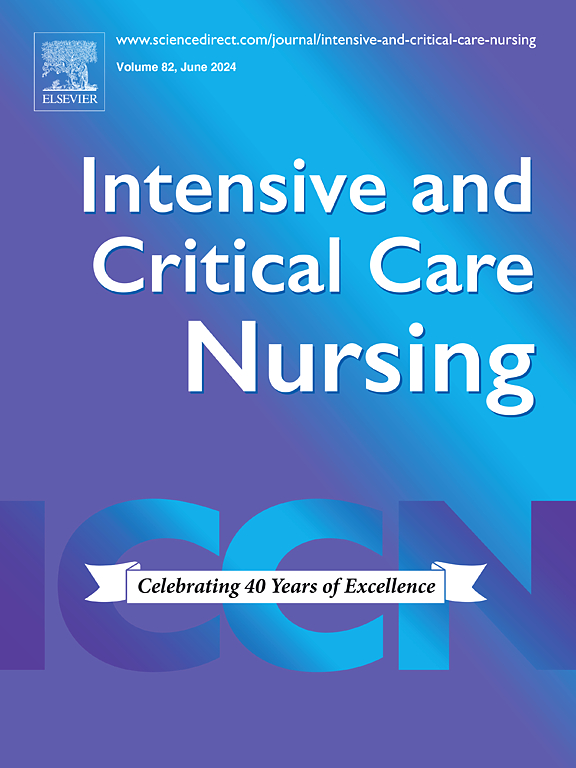体外膜氧合期间ECMO专家对获得性感染的挑战:一项国际定性ECMO感染研究
IF 4.7
2区 医学
Q1 NURSING
引用次数: 0
摘要
尽管体外膜氧合(ECMO)具有挽救生命的潜力,但它并非没有重大挑战,特别是与治疗期间获得性感染相关的挑战。本研究的目的是探讨ECMO专家在ECMO患者获得性感染方面面临的挑战。方法本定性研究涉及来自世界各地的19名ECMO专家,他们代表了ECMO护理的关键学科,包括重症监护医生、ECMO护士、呼吸治疗师、微生物学家、心脏病学家、心脏外科医生和灌注师。所有参与者至少有5年的ECMO专业经验。在2024年8月至12月期间进行了有目的的抽样。数据通过深度、半结构化访谈和开放式问题收集,并使用传统的内容分析进行分析。结果数据分析揭示了ECMO患者获得性感染的两个主要主题。第一个主题,感知挑战,包括ecmo的独特性,包括其新颖的科学,不同的套管和导管,以及不同的设备,以及对感染指标缺乏共识,如非特异性实验室检查,缺乏统一的感染定义,以及缺乏临床体征。其他挑战包括依赖临床经验而不是可靠的证据、有限的国际指南和患者特定因素。第二个主题侧重于感染管理策略,强调以患者为中心的护理,家庭参与,通过科学会议和前瞻性研究促进证据,通过遵守无菌原则进行预防,以及加强多学科团队合作。结论获得性感染的挑战是ECMO患者面临的最重要的问题之一,当然,其预防方法也在不断发展。研究结果表明,ECMO患者的获得性感染是一个严重的挑战,需要以患者为中心和团队为基础的护理。需要更明确的临床指南来检测和预防感染。注重预防、持续教育和加强团队合作可以改善治疗效果。加强科学证据对临床决策也至关重要。本文章由计算机程序翻译,如有差异,请以英文原文为准。
ECMO specialist’ challenges towards acquired infections during extracorporeal membrane oxygenation: An international qualitative ECMO infection study
Background
Despite the life-saving potential of Extracorporeal Membrane Oxygenation (ECMO), it is not without significant challenges, particularly those associated with acquired infections during treatment. The purpose of this study was to explore the challenges that ECMO specialists faced regarding acquired infections by ECMO patients.
Methods
This qualitative study involved 19 ECMO specialists from around the world, representing key disciplines in ECMO care-including critical care physicians, ECMO nurses, respiratory therapists, microbiologists, cardiologists, cardiac surgeons, and perfusionists. All participants had at least five years of dedicated ECMO experience. Purposive sampling was conducted between August and December 2024. Data were collected through in-depth, semi-structured interviews with open-ended questions and analyzed using conventional content analysis.
Results
Data analysis revealed two principal themes regarding acquired infections in ECMO patients. The first theme, perceived challenges, encompassed the unique nature of ECMO-including its novel science, diverse cannulas and catheters, and varied equipment-alongside a lack of consensus on infection indicators, such as non-specific laboratory tests, absence of a unified infection definition, and scarce clinical signs. Additional challenges involved reliance on clinical experience over robust evidence, limited international guidelines, and patient-specific factors. The second theme focused on infection management strategies, emphasizing patient-centered care, family involvement, promotion of evidence via scientific meetings and prospective studies, prevention through adherence to aseptic principles, and strengthening multidisciplinary teamwork.
Conclusion
The challenges of acquired infections are one of the most important problems of patients undergoing ECMO, and of course, the approaches to its prevention are evolving.
Implication for Clinical Practice
The findings show that acquired infections in ECMO patients are a serious challenge requiring patient-centered and team-based care. Clearer clinical guidelines are needed for infection detection and prevention. Focusing on prevention, continuous education, and enhancing teamwork can improve treatment outcomes. Strengthening scientific evidence is also essential for clinical decision-making.
求助全文
通过发布文献求助,成功后即可免费获取论文全文。
去求助
来源期刊

Intensive and Critical Care Nursing
NURSING-
CiteScore
6.30
自引率
15.10%
发文量
144
审稿时长
57 days
期刊介绍:
The aims of Intensive and Critical Care Nursing are to promote excellence of care of critically ill patients by specialist nurses and their professional colleagues; to provide an international and interdisciplinary forum for the publication, dissemination and exchange of research findings, experience and ideas; to develop and enhance the knowledge, skills, attitudes and creative thinking essential to good critical care nursing practice. The journal publishes reviews, updates and feature articles in addition to original papers and significant preliminary communications. Articles may deal with any part of practice including relevant clinical, research, educational, psychological and technological aspects.
 求助内容:
求助内容: 应助结果提醒方式:
应助结果提醒方式:


